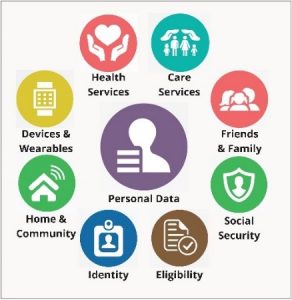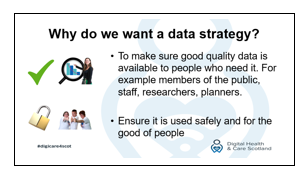Participation
Engaging on the Data Strategy for Health and Social Care
February 16, 2022 by Jen Swan 2 Comments | Category Guest blog, Our work, Participation in action
Written by: Zoe Rohde (Communication and Content Manager, Digital Health and Care Directorate)
In October 2021 with the publication of the refreshed Digital Health and Care Strategy, we committed to developing Scotland’s first dedicated Data Strategy for Health and Social Care.
Why a dedicated data Strategy for health and care?
People have asked why a dedicated data strategy for health and social care? We need only look at the last two years to answer that: since the start of the pandemic there has been a dramatic shift in how data is used within health and care. Think of the data we receive daily about the vaccination roll-out programme or the number of Covid cases in certain areas. All of this has helped to keep us safe and keep infection rates down. Through strong collaboration across the sector, it has become clear that health and wellbeing outcomes can be significantly improved if data is more accessible and flows more smoothly (and securely) within and across systems. It can also empower individuals and communities – equipping us to make more informed decisions about our own health and care.
Engagement programme for the data strategy
 Given the importance of data to all our lives, it is vital we developed a robust engagement approach. The engagement programme is wide in scale and employs a phased approach. Phase one has concentrated on information gathering; based on our findings from a literature review, we identified gaps in our knowledge base and developed questions tailored to fill those gaps and adapted them for each stakeholder group. Each set of questions were also considered and shaped by feedback from the Digital Health and Care Data Strategy Working Group. This is a small team with expertise on health and care data. They are responsible for driving the development of the strategy. Our stakeholder groups include health and care professionals; data and information governance experts; local authorities; civil liberties groups; business and innovation; the children’s sector; our Scottish Government policy colleagues; advocacy organisations and citizens.
Given the importance of data to all our lives, it is vital we developed a robust engagement approach. The engagement programme is wide in scale and employs a phased approach. Phase one has concentrated on information gathering; based on our findings from a literature review, we identified gaps in our knowledge base and developed questions tailored to fill those gaps and adapted them for each stakeholder group. Each set of questions were also considered and shaped by feedback from the Digital Health and Care Data Strategy Working Group. This is a small team with expertise on health and care data. They are responsible for driving the development of the strategy. Our stakeholder groups include health and care professionals; data and information governance experts; local authorities; civil liberties groups; business and innovation; the children’s sector; our Scottish Government policy colleagues; advocacy organisations and citizens.
Citizen engagement
Health and care data (how it is used, accessed, and shared) impacts us all, hence our engagement programme has a strong citizen focus. We have commissioned Nesta to carry out a deliberative research project which will help further understand the relationship citizens have with their data (including those whose voices are heard less often). The research will build on their Data Dialogues project which explored people’s relationship with their own health and care data. This has been valuable information for the development of the strategy. Using the information they gathered Nesta created an interactive website so that others could think about their relationship with regards health and care data. Why not use it to think about your own views?
We are also working directly with third sector advocacy organisations to conduct workshops with citizens via existing forums and panels. One such panel has been Inclusion Scotland’s People Led Policy Panel (PLPP). This is a panel made up of disabled people who are willing to share their ideas and views to shape policy areas and services that directly affect them. Another is the ALLIANCE’s Digital Citizen Panel, made up of citizens from across Scotland. We also listened to the views of people with learning disabilities at a session coordinated by the Scottish Commission for People with Learning Disabilities (SCLD). The Coalition of Carers in Scotland (CCS) assisted us in setting up a session with unpaid carers in Scotland and Children in Scotland (CIS) also coordinated a session with children sector organisations. We are also planning for engagement sessions with Young Scot and the Recovery Network (a network for people with experience of mental health issues).
We worked closely with Inclusion Scotland, the Alliance, SCLD, CCS and CIS to ensure our briefing papers and presentations were translated into an Easy Read format. The briefing notes were shared with participants in advance. We also held planning meetings to agree on the best format for each session. Given each of the organisation’s expertise on the health and care issues of their members, as well as a good understanding of the dynamics of each group, their input and guidance were invaluable. Accessibility issues were considered for each session and British Sign Language interpreters were on hand to assist when necessary.
The sessions tended to be lively; at times full of laughter, (the ‘tell us your favourite way of eating a potato’ ice breaker was very funny); and, considering the personal and moving stories told, at times much more serious. But above all, each of the sessions provided us with a wealth of information about the concerns, hopes and aspirations of people whose voices are often marginalised in discussions about health and care. The rich and detailed feedback we received will help shape the initial draft Data Strategy and we look forward to revisiting these groups in our subsequent rounds of engagement.
Next Steps
In March 2022 we will be moving into the next phase of our engagement programme. We intend to revisit the same groups, to check that what we captured, accurately reflects what people told us. It is an iterative process. A third round of engagement via a formal consultation is due to take place from May to July 2022. People will be able to submit feedback on the latest draft online, via the Citizen Space. For those who are unable or do not wish to provide an online submission, there will be an opportunity to meet with us and provide oral submissions. This will be supported by additional workshops.
Stay informed
We are committed to ensuring the process is a transparent one so will be keeping our stakeholders informed of developments via updates on our Working Group site, Twitter and through regular Health and Social Care blogs.
For more information on the Data Strategy for Health and Social Care you can contact Nel Whiting (Participation and Engagement Lead, Digital Health and Care) at Nel.Whiting@gov.scot
Scottish Government participation & engagement
Interested in receiving updates and insights into our work to embed good participation and engagement practices across the Scottish Government? Subscribe to the Scottish Government’s participation blog and follow us on twitter @scotgovengage
Tags: citizen engagement, data strategy, digital health and social care, Engagement, engagement strategy, health and social care, HSC, participation, policymaking, public engagement, scottish government


NHS Ltd. Why do you use the word ‘Engaging’ all the time? It sounds absolutely stupid. ‘Ok, I’m about to engage with this piece of litter!’ So what are you talking Bulk Data Criminals and Hackers? Are you going to fight someone or something, or are you going to marry something?
Also, how dare you use the word Citizen when talking about a data source. I think you’re more likely to visualise us at a similar level to pigs, 500000 scummier than your perfect thieving selves and certainly not engagement material.
NHS Ltd. Why do you use the word ‘Engaging’ all the time? It sounds absolutely stupid. ‘Ok, I’m about to engage with this piece of litter!’ So what are you talking Bulk Data Criminals and Hackers? Are you going to fight someone or something, or are you going to marry something?
Also, how dare you use the word Citizen when talking about a data source. I think you’re more likely to visualise us at a similar level to pigs, 500000 scummier than your perfect thieving selves and certainly not engagement material.